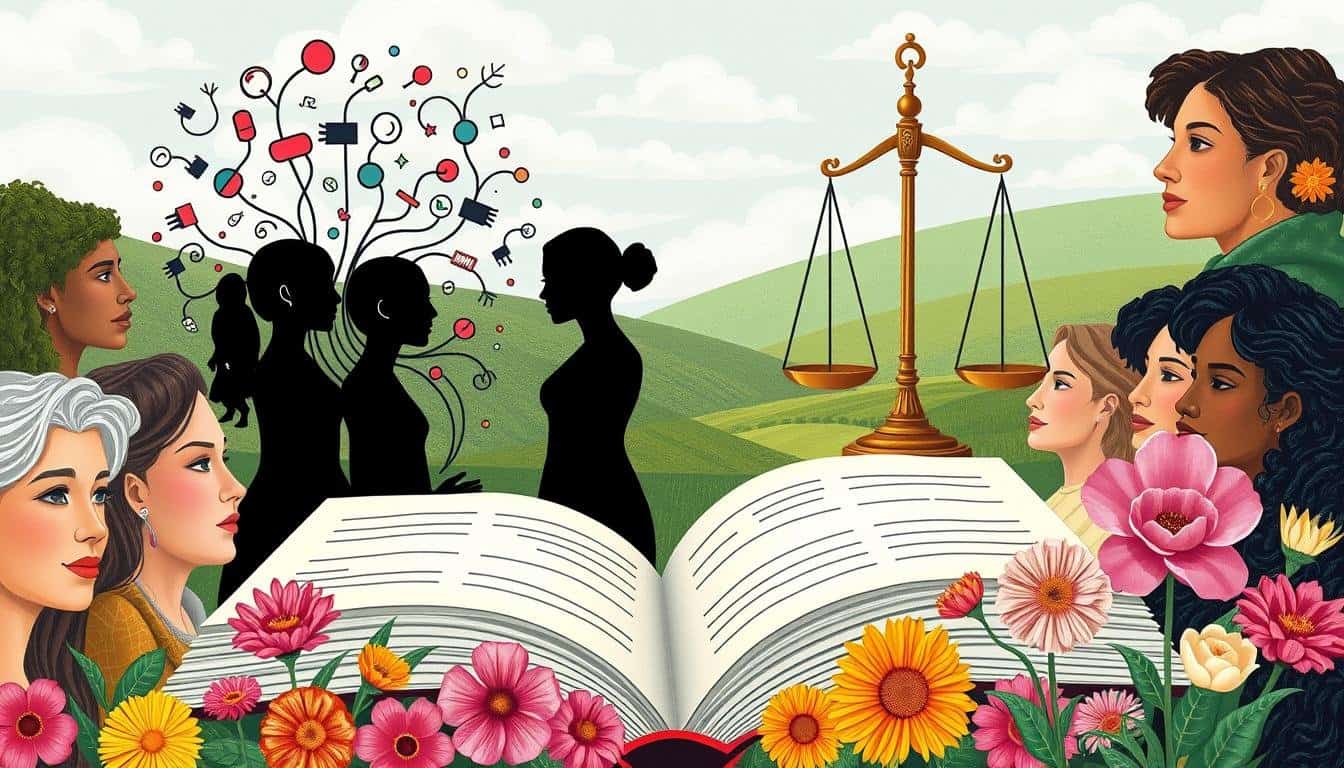Feminist Philosophy: Key Thinkers and Concepts
Have you ever thought about how our view of gender has changed over time? Feminist philosophy looks closely at these changes. It questions the ideas that shape our society. Since Mary Wollstonecraft in 1792, thinkers have looked at gender inequality and the systems that keep us down.
This guide will take you through the history and importance of feminist philosophy. It will cover its deep ideas and the people who have shaped them.
Thinkers have debated topics like feminist ethics and whether gender is natural or made by society. These discussions have big effects on how we see the world. As we explore feminist philosophy, we’ll see how it changes our views on ethics and metaphysics. It also shows us how we can work towards a fairer world for everyone.
Key Takeaways
- Feminist philosophy goes back to Mary Wollstonecraft’s work in 1792.
- Gender inequality is still a big issue today.
- The field looks at systems that keep people down.
- Important ideas include intersectionality and how society makes gender.
- Big names in feminist philosophy are Mary Daly, Hélène Cixous, and Carol Gilligan.
- Feminist philosophy deals with tough ethical questions and traditional topics.
Introduction to Feminist Philosophy
Feminist philosophy is a key movement that looks closely at how gender affects society. It aims to challenge old ideas and fight for women’s rights and equality. By focusing on women in philosophy, it brings new ideas to discussions on culture, politics, and ethics.
The Stanford Encyclopedia of Philosophy shows how feminist ideas have grown over time. It talks about different ways to think about feminism, how it changes philosophy, and various topics in feminist philosophy. These topics include debates on global justice, privacy, and how different cultures see the world.
Feminism has gone through “waves,” each focusing on different women’s issues. The first wave was about getting basic political rights in the late 1800s and early 1900s. The second wave, in the late 1960s and 1970s, wanted more equality in many areas. The third wave, in the 1990s, looked at how class, ethnicity, and race affect women’s lives.
Some feminist scholars say the “wave” idea is too simple. They believe it doesn’t capture the complex and ongoing nature of women’s struggles. Traditional political thought often ignored how personal life affects society. Feminists have changed this by showing the importance of looking at power and governance more broadly.
Feminist political philosophy looks at many ideas, like liberalism and radical views. It changes how women’s issues are seen in politics. It shows that history has often left out these concerns. Feminist ethics also looks at how gender influences morality and ethics, showing the need for diverse viewpoints.
In short, feminist philosophy is a key movement that changes traditional ideas. It encourages us to think deeply about how gender affects our lives and society.
What is Feminism?
Feminism is a wide range of beliefs and actions aimed at ending gender bias. It involves looking at different ideas that help shape feminist thought. These ideas work together to achieve the main goals of the movement. The history of feminism is important, with different waves focusing on various aspects of equality.
The first wave was about getting women the right to vote. Later waves dealt with issues like reproductive rights and equal pay. They also looked at how different groups of women face unique challenges.
Important books have greatly influenced feminist ideas. Works like “A Vindication of the Rights of Woman” by Mary Wollstonecraft have shaped our views. They talk about women’s rights and the obstacles they face in a society ruled by men.
Feminist movements have done more than just achieve past victories. They help us understand today’s gender issues. They show the need for a broad approach to feminism. This includes different types of feminism, like ecofeminism and queer feminism, which focus on various women’s experiences.
The following table shows some key feminist movements and what they focused on:
| Feminist Wave | Key Focus |
|---|---|
| First Wave | Women’s suffrage and legal rights |
| Second Wave | Reproductive rights, workplace equality |
| Third Wave | Intersectionality, body positivity |
| Fourth Wave | Digital activism, sexual harassment, and consent |
Feminist theory is a rich mix of ideas dedicated to gender equality. By engaging with these diverse beliefs and actions, we can better address gender bias today.
Historical Context of Feminist Philosophy
The roots of feminist philosophy go back to earlier feminist thought. The women’s rights movement played a big part in this. Starting in the late 19th and early 20th centuries, women’s rights became linked with philosophical ideas. The first wave focused on legal rights, especially the right to vote. Thinkers like Mary Wollstonecraft challenged old ideas that kept women silent.
In the mid-20th century, the second wave of feminism started again. It brought up discussions on women’s oppression in philosophy. Feminist thinkers pointed out how women were left out of intellectual talks and how gender biases were in famous philosophical texts. They showed how thinkers like Aristotle and Kant had biases against women. This led to a call for including women’s ideas in history and philosophy.
Simone de Beauvoir’s “The Second Sex” was a key book in this change. Her ideas helped people see how society makes gender. This idea helped start the third wave of feminism, which looked at race, class, and gender together.
However, the idea of “waves of feminism” is not without debate. Some say it simplifies the complex experiences and views in feminist thought. So, while we see progress in different eras, there’s ongoing discussion about this model’s usefulness.
Feminist philosophy and big social movements are still connected. Seeing women’s rights as political has made philosophy more relevant to everyday life. It brings important ideas into debates on gender equality and justice.
Here’s a quick look at the main waves of feminism and their impact on feminist philosophy:
| Wave of Feminism | Time Period | Main Focus | Key Thinkers |
|---|---|---|---|
| First Wave | Late 19th – Early 20th Century | Legal Rights, Suffrage | Mary Wollstonecraft |
| Second Wave | 1960s – 1980s | Workplace Rights, Reproductive Rights | Simone de Beauvoir, Betty Friedan |
| Third Wave | 1990s – Present | Intersectionality, Diversity in Feminism | Judith Butler, bell hooks |
Key Thinkers in Feminist Philosophy
Feminist philosophy has been shaped by many important thinkers. Simone de Beauvoir and Judith Butler are two key figures. They have greatly influenced our understanding of gender and womanhood.
Simone de Beauvoir and The Second Sex
Simone de Beauvoir wrote a groundbreaking book called The Second Sex. It challenged old views of women and showed how society makes gender identities. She said “One is not born, but rather becomes, a woman” to highlight that gender comes from society, not biology.
This book was a big step for feminism. It showed the deep inequalities women face and asked us to rethink their place in society. Beauvoir’s ideas about existentialism and feminism are still important today.
Judith Butler and Gender Theory
Judith Butler is a major name in feminist thought, especially in gender theory. She believes gender is something we do, not just who we are. This idea challenges the traditional view of gender as fixed.
Her work on identity and its fluid nature has started important discussions. It has helped us see gender in new ways. Butler’s ideas also help us understand how different identities interact with power.
Simone de Beauvoir and Judith Butler have greatly influenced feminist philosophy. They keep us thinking about identity, power, and justice in relation to gender.
| Thinker | Key Work | Main Contribution | Field of Influence |
|---|---|---|---|
| Simone de Beauvoir | The Second Sex | Critique of women’s societal roles | Feminist Theory, Existentialism |
| Judith Butler | Gender Trouble | Introduction of gender performativity | Gender Studies, Queer Theory |
Feminist Philosophy: Key Thinkers and Concepts
Feminist philosophy brings new ideas to traditional discussions. It has grown thanks to thinkers who focus on topics like freedom, the body, and how we see others. Christine de Pisan, from the late 14th to early 15th century, was one of the first to push for women’s education. This idea was key to fighting for gender equality.
Later, in the 16th century, Moderate Fonte added to feminist ideas with her book, “The Worth of Women.”
In the late 17th century, Mary Astell suggested creating secular convents for women. This was an option for those who didn’t want to marry or take a religious vow. The 18th century saw big steps forward with Olympe de Gouges and her “Declaration of the Rights of Woman.”
Then, in 1792, Mary Wollstonecraft wrote “A Vindication of the Rights of Woman.” She argued for women’s education and political rights.
The 19th century brought Sojourner Truth and Susan B. Anthony to the spotlight. Truth’s “Ain’t I a Woman” talked about race and gender issues. Anthony’s speech after her arrest in 1872 showed how limited women’s rights were.
Nancy Cott highlighted the important changes in the 1920s, a key time for women’s suffrage.
In the 20th century, Simone de Beauvoir changed feminist thought with “The Second Sex” in 1949. She looked at how society views women as “the other.” This idea was very influential.
Since the 1970s and 1980s, many feminist theories have grown. They were influenced by Marxism and socialism, making feminist ideas richer.
Today, feminist philosophy aims to include many viewpoints, challenging unfair systems. It keeps pushing for gender equality, especially in education. The ideas from these thinkers still inspire new research and actions.
| Thinker | Period | Key Contribution |
|---|---|---|
| Christine de Pisan | Late 14th – Early 15th century | Advocated for female education |
| Moderata Fonte | 16th century | Authored “The Worth of Women” |
| Mary Astell | Late 17th century | Proposed secular convents for women |
| Olympe de Gouges | 1791 | Published “Declaration of the Rights of Woman” |
| Mary Wollstonecraft | 1792 | Wrote “A Vindication of the Rights of Woman” |
| Sojourner Truth | 1851 | Penned “Ain’t I a Woman” |
| Susan B. Anthony | 1872 | Spoke on women’s limited rights after arrest |
| Simone de Beauvoir | 1949 | Published “The Second Sex” |
Approaches to Feminist Philosophy
Feminist philosophy looks at gender issues and inequalities in many ways. It includes analytic feminism and continental feminism. These methods give us new views and tools to understand feminist theories and practices better.
Analytic Feminism
Analytic feminism focuses on clear thinking and careful analysis. It looks at gender-related philosophical problems. By using analytical methods, it helps us understand complex topics like autonomy and objectification.
This approach encourages deep discussions and critical thinking. It helps us see traditional ideas through a feminist perspective. Key topics include:
- Feminist ethics
- Gender and political theories
- Sex work and sexuality
Continental Feminism
Continental feminism emphasizes history and culture in feminism. It shows how context and experiences shape gender issues. It talks about identity, race, and globalization, among other things.
This approach connects philosophy with social critique. It leads to a deep look at how society affects women’s lives. Important topics include:
- Intersectionality and power dynamics
- Global justice and feminism
- Cultural critiques and popular culture
Analytic and continental feminism offer key insights into feminist thought. They help us see the ongoing inequalities in society. By exploring these approaches, scholars gain a deeper understanding of feminist ideas.
| Feature | Analytic Feminism | Continental Feminism |
|---|---|---|
| Focus | Logical clarity and analysis | Historical and cultural critique |
| Methodology | Systematic problem-solving | Existential and contextual exploration |
| Key Topics | Feminist ethics, political theory | Intersectionality, globalization |
| Goal | Address specific philosophical problems | Critique societal constructs |
Feminist Ethics and Moral Philosophy
Feminist ethics became a big part of moral philosophy in the 1970s. This was when feminism and gender relations started getting more attention. Pioneers like Mary Astell and Mary Wollstonecraft talked about women’s moral abilities and wanted equal education for everyone. Their ideas helped shape feminist ethics.
Before, moral philosophy mostly ignored gender. Feminist ethics changed that by showing how gender affects moral beliefs. In the 1980s, thinkers like Carol Gilligan pointed out that men’s views on morality weren’t the only ones. Gilligan showed how women’s morality is different, leading to talks about care ethics and ethics based on relationships.
The Third Wave of feminism made feminist ethics even stronger. It brought up the complex lives of women and let many voices be heard. Groups like the Combahee River Collective and thinkers like Alison Jaggar pushed for logic based on social justice. They talked about important issues like reproductive rights and healthcare gaps, changing how feminist ethics sees society.
Even with progress, feminist ethics still has debates. Some say it’s hard to agree on moral frameworks and gender roles. But, these discussions are key for solving today’s ethical problems and fighting for gender equality and justice. As feminist ethics grows, it makes us think more about morality and different gender relationships and social setups.
| Key Figures | Contributions |
|---|---|
| Mary Wollstonecraft | Early pioneer in advocating for women’s rights and moral capacities. |
| Carol Gilligan | Introduced care ethics and emphasized women’s moral decision-making. |
| Nel Noddings | Focused on caring ethics, prioritizing personal relationships in moral education. |
| Alison Jaggar | Advanced the need for feminist ethics in broader moral philosophy discussions. |
| Sharon Higgins | Examined social arrangements and practices related to women’s subordination. |
Interventions in Traditional Philosophical Areas
Feminist thought has changed traditional philosophy, especially in political philosophy. It brings personal experience to the forefront, challenging old ideas. It also talks about topics like home life and reproductive rights, making politics wider.
Political Philosophy and the Personal is Political
The saying ‘the personal is political’ is key in today’s feminist political thought. It shows how our personal lives affect our political views. This leads to talks about power and who gets to make decisions.
Feminist thinkers push for a broader view of political thought. They want to include more voices and stories. This makes politics more about everyone’s life, not just some.
Feminist Perspectives in Ethics and Aesthetics
In ethics and aesthetics, feminist ideas are changing how we think about right and wrong, and what beauty is. They focus on relationships and care, not just logic. This means looking at the lives of women and others often left out.
Also, feminist aesthetics is changing how we see art and culture. It’s about breaking down old ideas of beauty and making room for everyone. This shows how important different views are in ethics and aesthetics.
Conclusion
Feminist philosophy has grown over time, changing with society and feminist movements. It gives us deep insights from thinkers like feminist standpoint theory. This theory shows how our social and historical background shapes what we know.
It also values the experiences of women and marginalized groups. This helps us see social issues more clearly.
The future of feminist thought will keep evolving to tackle today’s problems. It will focus on topics like intersectionality, empowerment, and fighting systemic inequalities. Scholars like Sandra Harding and Patricia Hill Collins show how these ideas can improve our understanding and make a difference in many areas.
These theories are key to challenging unfair systems and pushing for gender equality. By thinking about these ideas, we can see how we can help feminist movements in our own lives. Adopting these philosophies makes our studies richer and helps us change our daily lives for the better.
Source Links
- Feminist philosophy – Routledge Encyclopedia of Philosophy
- Feminist Philosophy
- Feminist Philosophy
- Feminist Political Philosophy
- 9.6 Feminist Theories of Ethics – Introduction to Philosophy | OpenStax
- Feminism
- Feminist Epistemology | Internet Encyclopedia of Philosophy
- Amia Srinivasan · What should feminist theory be? (2022)
- Feminist History of Philosophy
- Philosophical feminism | Gender Equality, Social Justice & Human Rights
- Feminist Philosophers of the 20th Century
- Top 20 Influential Modern Feminist Theorists
- Seven Female Philosophers You Should Know About – The Ethics Centre
- Feminism | Definition, History, Types, Waves, Examples, & Facts
- Feminist theory
- Feminist Theory – Theoretical Models for Teaching and Research
- Feminist Ethics
- Feminism and Feminist Ethics
- Feminist Ethics
- Feminist Crisis? Philosophical Interventions
- Feminist Standpoint Theory | Internet Encyclopedia of Philosophy







